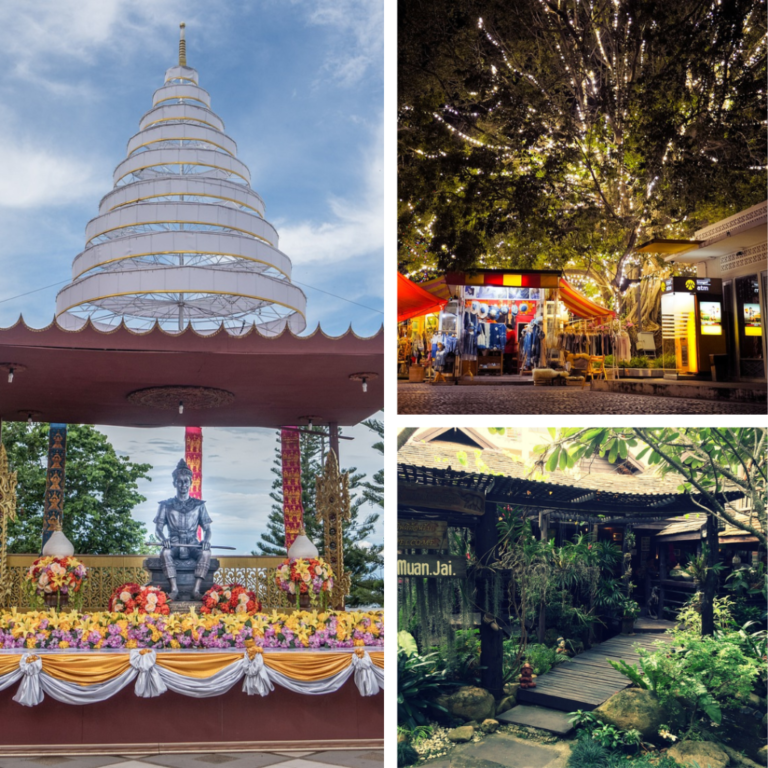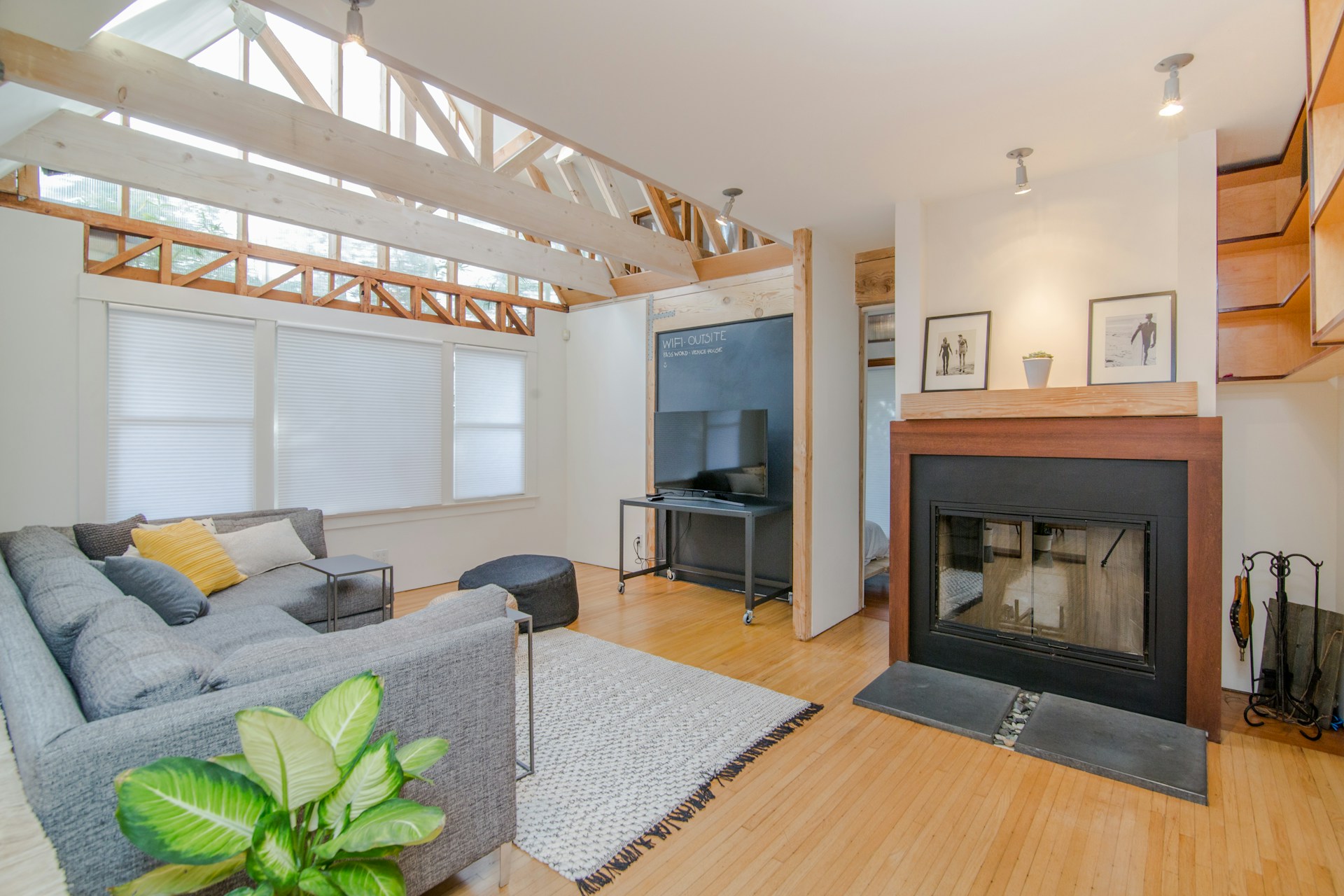Chiang Mai for Digital Nomads: Work and Explore Guide
Chiang Mai is one of the best cities in Thailand to work remotely. Find out why with this guide to being a digital nomad in Chiang Mai.
More and more digital nomads are choosing Thailand as their destination to live and work remotely. This Southeast Asian country blows people away with its affordable cost of living, stunning scenery and vibrant culture. Of all its cities, Chiang Mai is the most popular. Why? You’ll find out in this guide to being a digital nomad in Chiang Mai. We tell you everything you need to know about this city in the north of Thailand, including the services and facilities it offers for digital nomads.
But before we go on to tell you why you should choose Chiang Mai to work as a digital nomad, here’s a brief introduction to this city. With a population of approximately 1.2 million, a tropical savannah climate and a low cost of living, Chiang Mai is Thailand’s city of choice for those who are looking for such a lifestyle. It is located in the north, immersed in an unbeatable natural environment and surrounded by the highest mountains in the country. The capital, Bangkok, is 700 km away and is well connected by road and air to today’s destination. At the same time, Chiang Mai is the ideal starting point for exploring the wonders of the north of the country, which are less well known than those in the south, but just as attractive.
With all that said, let’s start exploring Chiang Mai and all it has to offer digital nomads!
Why be a digital nomad in Chiang Mai?
With its vibrant cultural scene, low cost of living and growing community of remote workers, this Thai city offers an ideal environment for those seeking a flexible lifestyle and an authentic Southeast Asian experience. It’s no coincidence it’s called the “capital of digital nomads”. Its perfect balance between a leisurely pace of life and a perfect infrastructure for remote workers has earned it this nickname.
Here are some reasons why you should choose Chiang Mai to live as a digital nomad:
1. Internet connectivity and speed
Chiang Mai’s digital infrastructure is excellent, with a reliable and fast internet network in most coworking spaces, cafes and accommodation. In areas such as Nimmanhaemin and the old town, connections can be found with speeds of 30 to 50 Mbps, more than sufficient for intensive tasks such as video conferencing and uploading and downloading large files.
Even in rented flats, fibre-optic connections are common, giving digital nomads peace of mind knowing that they can work trouble free. In addition, SIM cards with unlimited data are affordable and offer an alternative in case you need connectivity outside coworking spaces. On that point, don’t forget that with your Holafly eSIM you get unlimited internet at a great price, so working from Chiang Mai will be much easier.
2. Coworking spaces
Chiang Mai has a wide range of coworking spaces to suit different budgets and work styles. Punspace, located in the heart of Nimmanhaemin, is one of the most popular options, with rates starting at 600 baht (about US$18) per day. There is also Hub 53, which combines co-living and coworking, ideal for those who want a community in the same space. Another notable space is CAMP, a free coworking space located inside the Maya Mall, which attracts freelancers and students alike with its relaxed atmosphere and the option to extend your stay with small purchases.
3. Affordable and flexible accommodation
The cost of living in Chiang Mai is one of the most affordable in Asia for digital nomads, especially in terms of rent. The Nimmanhaemin area is particularly convenient as it is close to major coworking facilities, coffee shops and a variety of restaurants. It also has studios available from 5,000 baht per month (approximately $150) and co-living options, which are a great alternative for those who want a community experience. Such options include Hub53, Alt_ChiangMai and The Social Club, where it is possible to rent rooms and have access to coworking areas in the same place, allowing you to combine work and daily life. In addition, many accommodations in Chiang Mai are flexible when it comes to length of stay, so it is possible to find short-term contracts without paying a large upfront fee.
4. Cultural richness
With more than 300 Buddhist temples, Chiang Mai is known as the “Rose of the North”. What gives it its special charm is its perfect balance between tradition and modernity, with an old town full of historic temples (Wat Phra Singh and Wat Chedi Luang are among the best known) and a modern side that offers all the services you could need.
Living and working in Chiang Mai will give you the chance to appreciate the colourful Thai architecture, participate in spiritual events and be part of one of Thailand’s most beautiful festivals, the Loy Krathong and Yi Peng (Lantern Festival), which is attended by people from all over the world. At the same time, you’ll be able to take a stroll around the colourful markets, which we consider essential to get a real taste of the local culture, and take part in a Thai massage session or a tea ceremony.
All in all, all these experiences will help you discover the vibrant culture of Chiang Mai (and Thailand in general).

5. Gastronomic scene
Another reason why Chiang Mai is an attractive city for digital nomads is its cuisine. Thai cuisine is very tasty, with rice as the star ingredient and spiciness as a distinctive feature of the dishes. Be sure to try Khao Soi, the most popular food in town. You’ll find it in all its restaurants and in the hundreds of street food stalls lining the streets. Or Sai Oua, another of Chiang Mai’s most famous street foods.
Chiang Mai’s local markets, such as the famous Night Market or Warorot Market, are ideal for sampling these specialities and immersing yourself in street food. Snacks such as grilled pork kebabs, sticky rice and traditional sweets are the order of the day. In addition, you can get fresh ingredients at very good prices.
6. Weekend getaways and nature
As mentioned above, Chiang Mai is the ideal starting point for exploring northern Thailand. Just a few kilometres away is Doi Suthep, a mountain crowned by a temple on its peak, which offers excellent hiking trails. Other options for getaways include Chiang Rai and its famous White Temple, or the Golden Triangle, where Thailand, Laos and Myanmar converge. We also recommend visiting the ruins of Wiang Kum Kam, located just 5km from the city, and Doi Inthanon National Park, home to Thailand’s highest peak. And for an exceptional experience, you can go to the Elephant Nature Park elephant sanctuary.
All these options will allow you to enjoy a relaxed lifestyle, combining work with the possibility of discovering Thailand’s natural and cultural richness.
Visas for digital nomads in Thailand
Thailand is one of many countries that offer a visa for digital nomads. Therefore, if you plan to live and work in Chiang Mai, you will be able to access a variety of visas that allow you to stay legally. Here is a brief description of each:
- Tourist visa: this is the simplest and most affordable option for those planning a short stay in Chiang Mai. It offers a stay of up to 60 days, with the possibility of extending it for an additional 30 days at a local immigration office. For those who wish to spend a short period of time working remotely, this visa is ideal, but it does not allow you to work with Thai companies. The only way to renew it is to leave and re-enter the country.
- Multi-Entry Tourist Visa (METV): this is an option for those seeking a longer stay. It allows multiple entries into the country within a six-month period, which is ideal for those who plan to tour neighbouring countries and return to Thailand at different times. With each entry you can stay for 60 days and it is renewable for an additional 30 days.
- Non-immigrant visa (B): this type of visa is suitable for those who are employed by a foreign company and need a long-term stay in the country. Although it was originally created for business travellers coming to Thailand, many digital nomads use it because of its 90-day validity, with an option to extend. At the same time, it has the advantage that it can be converted into a work visa if the nomad obtains a job in a local company.
- Non-immigrant visa (O): this visa is for people who need to reside in Thailand for family or accompanying family reasons, although some nomads choose this visa if they are travelling with family. It is valid for one year and can be renewed with extensions, but its use as a remote work visa is somewhat limited.
- Smart Visa: this was designed to attract highly skilled professionals and entrepreneurs who wish to work or invest in Thailand. This visa is one of the most suitable for digital nomads with specific skills, such as technology or science, and has a duration of 1 to 4 years. Smart Visa benefits include work permit exemptions and the ability to bring family members without the need for additional visas.
- Thailand Elite Visa Programme (Thailand Elite Visa): is a long-stay visa that allows holders to reside in Thailand for periods of 5 to 20 years. Although it comes at a high cost, this programme is suitable for digital nomads seeking long-term flexibility free from migration concerns. In addition, the programme includes exclusive benefits, such as access to medical services and personal assistance with immigration procedures.
For most of the above options, there are extension options that vary depending on the type of visa and immigration status. In some cases, such as with the non-immigrant visa (B), it is possible to change the type of visa once in the country, provided certain requirements are met.

The best neighbourhoods in Chiang Mai for working as a digital nomad
If you’re going to be a digital nomad in Chiang Mai, you’ll want to know which are the best neighbourhoods in the city to live and work in. Bear in mind that it is a large city, with many different areas, so it is important to be aware of which ones are best suited to the kind of life you want to lead.
Here are the best areas and neighbourhoods to live as a digital nomad in Chiang Mai:
1. Nimmanhaemin
This neighbourhood, located northwest of the old town, is known as the modern epicentre of Chiang Mai. Its lively atmosphere, many cafés and coworking spaces make it one of the best options for digital nomads. It also has an attractive leisure and entertainment offer, ideal for making the most of non-working hours. So much so that its community of digital nomads is large and active, which facilitates networking and the creation of professional contacts. Another advantage is that it is well connected by public transport to the rest of the city and close to Chiang Mai University, which makes it attractive for students as well.
Here you’ll find everything from modern flats to luxury condominiums. It is, however, the most expensive and trendiest part of the city, so you will have to spend more money if you want to live here. Of course, the quality of life is worth the investment.
2. Santitham
Also north of the old town and close to Nimmanhaemin is another of Chiang Mai’s more affordable neighbourhoods for digital nomads. Santitham is an area that offers lower rents and living costs and a more local and authentic atmosphere, as it is less touristy than the old town and Nimmanhaemin.
Santitham has a relaxed, less commercial atmosphere, with local markets, such as Santitham Market, supermarkets, gyms and some coworking spaces. There are also small cafés and restaurants where you can eat and work at the same time. Accommodation ranges from basic flats to more spacious houses.
3. Old City
The old town is the heart of Chiang Mai. This historic area is surrounded by a moat and ancient walls, which gives a magical touch to its spaces. It is perfect for digital nomads seeking a more direct contact with Thai culture, as it is home to many of Chiang Mai’s 300 Buddhist temples, including Wat Phra Singh and Wat Chedi Luang. There are also markets, traditional restaurants, street food stalls, small cafés and many other details that make this neighbourhood special.
Another advantage of living in the old town is that it allows you to be close to cultural events and festivals that take place throughout the year, such as the Flower Festival and Songkran (Thai New Year).
4. Riverside
East of the old town and along the Ping River, you’ll find this quaint and relaxed neighbourhood where you can also live comfortably as a digital nomad. The river is the main protagonist here, with its banks full of charm, bars and restaurants where you can share a meal and enjoy pleasant views of the surroundings.
Riverside is more of an attractive neighbourhood for nature lovers, with parks and trails along the river. The nightlife is more relaxed compared to other areas of the city, so it is also attractive to workers looking to escape the youthful hustle and bustle. So if you are looking for an active and healthy lifestyle, you will definitely love living here. It offers modern flats and traditional houses at slightly higher prices, but with pleasures such as river views.
5. Hang Dong
Hang Dong is a neighbourhood in the south of Chiang Mai, known for its residential communities and tranquil atmosphere. Although it is further away from the city centre, it offers a more rural and relaxed experience. For digital nomads looking to escape the urban hustle and bustle, Hang Dong can be an attractive option.
The area has some cafés and coworking spaces, although fewer than in other areas. Accommodation tends to be more spacious and affordable, with options including houses and villas. It is ideal for those seeking a more natural and peaceful environment, although it is advisable to have your own means of transport to get around comfortably.
Digital Nomad in Chiang Mai: main coworking spaces

One key thing a good city for digital nomads has to have is coworking spaces. This lifestyle is often quite solitary, so creating links with other remote workers can be a great help in adjusting to a new place of residence. With this in mind, coworking spaces are the ideal places for this. Fortunately, Chiang Mai is one of these cities.
Coworking spaces in Chiang Mai offer digital nomads different membership options, so you can choose according to your needs. From daily to monthly passes, you will always have the option to adapt the hours you spend there to your budget. In these places the internet connection is very good and there are plenty of facilities. In addition, networking events, conferences, workshops and other events are often organised to help meet other professionals and develop new skills.
These are the main coworking facilities in Chiang Mai:
- Punspace: with three strategic locations in Nimmanhaemin, Wiang Kaew and Tha Phae Gate, it is one of the most recognised coworking spaces in Chiang Mai. It offers 24/7 access, high-speed internet and both indoor and outdoor work areas. It also has meeting rooms and an active community of professionals.
- Hub53: located in Nimmanhaemin, Hub53 combines coworking spaces with co-living options, facilitating a holistic experience for digital nomads. It offers private offices, meeting rooms and common areas designed to foster collaboration.
- CAMP (Creative and Meeting Place): located in the Maya shopping centre, this 24-hour coworking space. Although popular with students, it is also frequented by freelancers and digital nomads. It offers free internet when you make a purchase in the cafeteria and has spacious and comfortable work areas.
- Alt_ChiangMai: this coworking and co-living space is located in the old town of Chiang Mai. It offers a modern environment with facilities such as meeting rooms, common areas and a community focused on professional growth.
- Yellow Coworking Space: located in Nimmanhaemin, it is noted for its vibrant atmosphere and active community. It offers high-speed internet, meeting rooms and regular events to encourage networking among its members.
- StarWork: Located near the old town, this coworking space offers a variety of workspaces, from shared desks to private offices. It has modern facilities, meeting rooms and a diverse community of professionals.
- The Brick Startup Space: this space is geared towards entrepreneurs and startups, offering not only work areas, but also incubation and acceleration programmes. It is located in the Chang Phueak area and has modern facilities and a community focused on innovation.
As you can see, you will have more than one coworking option to work as a digital nomad in Chiang Mai.
Important: If you are a frequent traveler and want to stay connected without worrying about expensive roaming or looking for a new SIM at every destination, Holafly’s subscription plans are for you. With a single eSIM, enjoy internet in more than 170 countries for a fixed price and no surprises on your bill. travel without limits and connect easily and securely! 🚀🌍

What taxes will I have to pay in Thailand?
As a digital nomad in Chiang Mai, you will also have to pay taxes. For starters, if you stay in Thailand for more than 180 days, you will be considered a tax resident and will be subject to tax on your global income.
You will also have to pay income tax, i.e. on all your income, regardless of its source. Tax rates are progressive, ranging from 0% to 35%, depending on income level. The same applies to VAT (Value Added Tax), the rate of which is currently 7%. Also, if you work for a Thai company, both you and your employer must contribute to the social security system. For the self-employed, these contributions are not compulsory, but it is advisable to consider private health insurance.
One thing to bear in mind is that Thailand has double taxation agreements with several countries, which mean you do not have to pay tax on the same income in both countries. It is essential to check whether a treaty exists between Thailand and your home country.
Health insurance in Thailand and the quality of the health system
Taxes, coworking spaces, the best neighbourhoods to live in… The list of things to consider before moving to Chiang Mai to work remotely is long. We add one more consideration to this: health insurance. As a digital nomad who is going to spend a few months in the country, having insurance to cover you for any accident or health problem is essential.
The quality of medical care in Thailand is high, especially in private hospitals and clinics, which have state-of-the-art technology and professionals who speak several languages, including English. Cities such as Bangkok, Chiang Mai and Phuket have renowned hospitals where health services are offered at international standards. In other words, you can rest assured that you will receive good medical care, especially if you have health insurance.
In Thailand, digital nomads can access a variety of international health insurances that offer comprehensive coverage. Top choices include Cigna Global, SafetyWing, Allianz Care, IMG Global and AXA Global Health. For more information, we suggest you read our guide to the best health insurance in Thailand.
Living as a digital nomad in Chiang Mai: everything you need to know

Chiang Mai is a vibrant city that combines a relaxed lifestyle with the convenience of modern amenities, making it a perfect destination for digital nomads. Here are some of the essentials of daily life in the city.
1. Transport and mobility
Getting around Chiang Mai is easy and accessible, so regardless of which neighbourhood you live in, you’ll have good options for getting around (in some cases more than others). Here are some transport options:
- Tuk-Tuks and Songthaews: these shared vehicles are inexpensive and very popular. Songthaews are red vans that follow fixed routes; the price depends on the distance, usually between 20-50 baht (0.6-1.5 dollars).
- Motorbike and bicycle rentals: renting a motorbike costs between 2,500-3,000 baht (approximately US$80-100) per month. Motorbikes are one of the most popular and practical means of getting around in and around Chiang Mai.
- Grab (the “Uber” of Thailand): The Grab app is popular and allows you to order taxis, which is ideal for convenient one-off transfers.
- Taxis and car hire: hiring a car can be useful if you plan to travel long distances, but note that for both this and motorbikes you’ll need an international driver’s licence; if you plan to reside here, you can apply for a Thai licence.
2. Financial management and the best banks for foreigners
Chiang Mai has banking options that make it easy for foreigners to manage their finances. Here are some of the banks you can use to manage your finances in Chiang Mai.
- Bangkok Bank: one of the most popular banks among expatriates, with English-speaking staff in most branches.
- Kasikorn Bank: this bank offers a bank account with no minimum deposit and an international debit card, ideal for payments anywhere in Thailand.
- Siam Commercial Bank (SCB): another good option for digital nomads. Its applications are easy to use for everyday banking transactions.
- Digital banks: Revolut and Wise are ideal for those who wish to avoid local bank charges, allowing them to manage funds in different currencies.
What about ATMs? While common, most charge fees of 150-220 baht (US$4.5-6.5) for each foreign card withdrawal. That being the case, if you plan to stay for several months in the country, it is best to open a local bank account.
3. Food: where to shop and eat
One of the best places to eat in Chiang Mai are the markets, although street food stalls are also a good option. At the same time, there are plenty of Thai and international restaurants where you’ll find more Western dishes. For example, in a street market you can find dishes starting at 30 baht (US$0.9), while in a mid-range restaurant a full meal will cost 150-200 baht (US$4.5-6). So, depending on the budget you want to spend on eating out, you can choose one or the other, or opt for both in a balanced way.
For shopping in supermarkets and markets we suggest:
- Rimping Supermarket: Popular with expats, with a wide range of international and organic products.
- Big C and Tesco Lotus: Cheaper supermarkets offering local and international products.
- Local markets: Markets such as Warorot Market are ideal for fresh fruit and vegetables at low prices.
4. Leisure and free time
Not everything in life is work, especially in a city like Chiang Mai, where you have a huge number of temples and cultural sites to visit. And if you go out to explore the surrounding area, there is even more on offer. Here are some ideas:
- Culture and temples: don’t miss Wat Phra Singh or Wat Chedi Luang, which are among the most visited temples.
- Nature and adventure: close to the city you have places like Doi Suthep, a mountain ideal for hiking, and the Chiang Mai Grand Canyon, a place for swimming and water jumping.
- Events and festivals: Chiang Mai is famous for its festivals, especially the Lantern Festival (Loy Krathong and Yi Peng). It takes place in November and is an exciting event where thousands of lanterns light up the sky.
- Gyms and wellness: Gyms like GoGym offer short-term memberships, ideal for digital nomads. In addition, there are many yoga centres and spas.
Cost of living as a digital nomad in Chiang Mai
Is it expensive to live as a digital nomad in Chiang Mai? Well, no, although of course it depends on the standard of living you want. In any case, Thailand in general is one of the most accessible countries in Southeast Asia, especially for digital nomads earning income in foreign currencies. Therefore, you will be able to live well without having to spend too much. The diversity of accommodation, food and transport options allows both budget travellers and those seeking more comfort to enjoy this vibrant city without exceeding their finances.
Here is an overview of the main expenses you will incur as a digital nomad in Chiang Mai:
1. Accommodation
The cost of accommodation in Chiang Mai is considerably lower than in other cities popular with digital nomads.
- Studies in popular areas (such as Nimmanhaemin): 5,000-8,000 baht per month (US$150-240).
- One-bedroom flats in buildings with amenities (swimming pool, gym): 10,000-15.000 baht per month (US$300-450).
- Co-living options such as Hub53 and The Social Club: typically cost between 8,000-12,000 baht ($240-360), including services such as internet, electricity and access to coworking spaces.
2. Food
Food in Chiang Mai is varied and affordable, from street food to high quality restaurants.
- Eat at street or local markets: 30-60 baht per plate (1-2 dollars).
- Meals at mid-range restaurants: a full meal costs around 100-200 baht (US$3-6).
- Supermarkets: Monthly shopping costs in supermarkets such as Rimping can be between 4,000-6,000 baht (US$120-180) for a balanced diet.
3. Coworking spaces
Chiang Mai has numerous coworking spaces that are ideal for digital nomads, and prices vary depending on the type of access you choose.
- Pay-per-day coworking: from 150 baht (US$4.5) per day in spaces such as CAMP in the Maya Mall.
- Monthly memberships: between 2,500-5,000 baht (US$75-150), depending on facilities and location. Punspace and Hub53 are some of the preferred options for the digital community.
4. Transport
Getting around Chiang Mai is easy and affordable.
- Motorbike rental: around 2,500-3,000 baht per month (US$80-100).
- Public transport: a songthaew or tuk-tuk ride costs between 20-50 baht (US$0.6-1.5). Grab (similar to Uber); more expensive but offers additional convenience.
5. Other expenditure
Some additional expenses you may want to consider include:
- Gym memberships: Gyms in Chiang Mai offer monthly memberships starting at 1,000-2,000 baht (US$30-60).
- Leisure activities: Excursions and activities in Chiang Mai are affordable, with entrance fees to places such as temples ranging from 30-50 baht (US$1-2), and trips to cenotes or nature reserves from 100-200 baht (US$3-6).
- Phone services: Mobile data packages are inexpensive, with high-speed internet plans starting at 300 baht per month (US$9).
6. Estimated monthly cost of living
A digital nomad in Chiang Mai can live comfortably on an average monthly budget of:
- Low budget (budget accommodation, local food, occasional coworking): between $700 and $900.
- Average budget (accommodation in popular areas, varied food, regular coworking): between $1,000 and $1,500.
- High budget (premium accommodation, meals in mid-high end restaurants, coworking in premium spaces): between 1,600 and 2,000 USD.
Digital Nomad in Chiang Mai: frequently asked questions
The cost of living in Chiang Mai is very affordable compared to other popular digital destinations. A digital nomad can live comfortably on a budget of between $700 and $1,500 per month, depending on lifestyle, type of accommodation and frequency of visits to coworking spots or restaurants.
Chiang Mai is one of the most connectivity-ready destinations for digital nomads in Asia. On average, connections in coworking spaces and coffee shops range from 30 to 50 Mbps, while some coworking spaces offer even higher speeds. Most residences and flats also have high-speed internet options.
Chiang Mai has several areas ideal for digital nomads, with Nimmanhaemin and the old town being the most popular. Nimmanhaemin is known for its cafes, coworking spaces, and vibrant international community, while the old town offers a cultural atmosphere with markets, temples and affordable accommodation options.
Yes, Chiang Mai is considered one of the safest places in Thailand for both expats and digital nomads. The city has a low crime rate and is quite friendly to foreigners. However, as elsewhere, it is advisable to take basic precautions, especially in crowded or unfamiliar areas.





 Language
Language 


















 No results found
No results found







